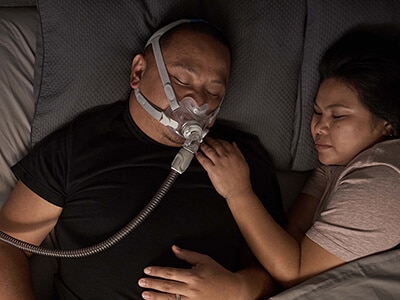Sleep apnoea testing & diagnosis
“With the proper diagnosis and treatment approach, most sleep disorders are easily treated,” says Dr. Wesley E. Fleming of the Sleep Center Orange County.
Understanding your clinical sleep test options
Step 2
If you’re worried you might have sleep apnoea, visit your doctor to discuss your symptoms. Your doctor will prescribe a sleep test if there is a suspicion that you might have sleep apnoea or another sleep-related condition. With the right diagnosis, you should receive the right treatment and your health should improve.
- Sleep lab test
In a sleep lab or hospital, clinical staff will place sensors on your body to monitor your sleep. With your permission, staff may also want to film your sleep study to gain more insight into your sleeping behaviour.
This is to assess for unusual movements in your sleep (like sleep talking or walking) and for night-time seizures. During this type of study, you’ll be required to stay overnight at the facility, so it’s a good idea to take everything you need for your usual sleeping routine, including pyjamas and toiletries.
- Home sleep testing
A home sleep test (HST) is similar to a sleep lab or hospital setup, with the added comfort and convenience of being in your own home. Before a home sleep study night, a sleep clinician will show you how to apply the sensors and monitors, and how to use the recording device during the night.
On the night you’ve scheduled your home sleep test, you’ll follow your normal evening routine, prepare for sleep, attach everything as you’ve been shown and start the recording. In the morning, you’ll remove everything as previously demonstrated and return the recording device to the sleep lab or hospital.
What happens if I receive a diagnosis?
If you are diagnosed with sleep apnoea, the most important thing is not to worry: sleep apnoea is highly treatable. Your doctor will probably prescribe CPAP therapy to help you get a full night of healthy sleep. If your sleep apnoea is mild or moderate, you might be prescribed a mandibular repositioning device (MRD), like the Narval appliance*. You might also be encouraged to make lifestyle changes, like losing weight or cutting down on alcohol.
If you’re told that you don’t have sleep apnoea but you continue to suffer from poor sleep or sleep apnoea symptoms, talk to your doctor. You might also want to check out our tips on healthy sleep habits.
Common medical terms you may see around sleep testing or in your test results
-
- Apnoea: This is when you stop breathing during sleep. For obstructive sleep apnoea, it’s when the entire airway is blocked, preventing air from entering the lungs.
- Hypopnoea: A reduction in airflow by 30% or greater associated with a similar reduction in the movement of your chest and belly, as well as 3% or greater fall in the blood oxygen level (4 % for Medicare guidelines).1
- Apnoea-Hypopnoea Index (AHI): measures the number of apnoea and hypopnoea events that occur per hour of sleep and is used to calculate the severity of sleep apnoea. For adults, 5 to 15 events indicate mild sleep apnoea, 15 to 30 events indicate moderate sleep apnoea, and more than 30 events indicate severe sleep apnoea. 2
- Home sleep test: a simple, convenient way to screen for sleep disorders such as sleep apnoea in the comfort of your own bedroom. A home sleep test can be used as an alternative to a lab-based PSG sleep study.
- Polysomnography (PSG) sleep study: a detailed sleep analysis that measures blood oxygen levels, pulse, brain waves, eye movement, etc. PSG sleep studies are usually conducted in a sleep lab and use techniques such as EEG, EMG and EOG (see below).
- Electroencephalogram (EEG): a recording of electrical differences within or between different brain regions. Brainwaves change significantly during different stages of sleep. By measuring brainwaves, sleep experts can understand your sleep patterns and identify disrupted sleep.
- Electromyogram (EMG): a recording of electrical activity from the muscular system. Muscular activity and tension tend to be different during different sleep stages. An EMG is used to understand the quality and quantity of your sleep and can also be used to diagnose periodic limb movement disorder.
- Electrooculogram (EOG): a recording of electrical activity within the eye. An EOG tracks eye position and movement during sleep. Involuntary eye movements can change significantly between stages of sleep so an EOG can measure how much time a person spends in different stages.
- Respiratory disturbance index (RDI): measures the number of respiratory disturbances that occur per hour of sleep. It is similar to the AHI but it includes respiratory event related arousals (RERAs). RERAs are sleep disruptions that don’t meet the criteria to be classified as apnoeas and hypopnoeas.3
Will treatment help?
Treating your sleep apnoea will help you sleep better and could improve your energy levels and overall health.3,4 Before you know it, you’ll be feeling your best every day!
Nick shares his inspiring perspective on how sleep apnoea treatment has changed his life and why it’s important to take charge of your health.
Keep exploring

Starting CPAP therapy
If you’ve recently been diagnosed, you might have some questions or concerns or just want some friendly advice. We’re here to help you get your CPAP therapy off to a successful, comfortable start.

Real people. Real CPAP stories
Watch patient testimonials and learn about their journey with sleep apnoea therapy.

Do you have sleep apnoea?
Are your sleep problems caused by untreated sleep apnoea? Take a few minutes to complete our free online assessment.
*Please note the Narval CC mandibular advancement device is not available in England, Scotland or Wales.
References:
- Berry, R.B., et al., Rules for scoring respiratory events in sleep: update of the 2007 AASM Manual for the Scoring of Sleep and Associated Events. Deliberations of the Sleep Apnea Definitions Task Force of the American Academy of Sleep Medicine. J Clin Sleep Med, 2012. 8(5): p. 597-619.
- Osman, A.M., et al., Obstructive sleep apnea: current perspectives. Nat Sci Sleep, 2018. 10: p. 21-34.
- Iber, C., Ancoli-Israel, S., Chesson, A., and Quan, S.F. for the American Academy of Sleep Medicine, The AASM Scoring Manual for Scoring of Sleep and Associated Events: Rules, Terminology and Specifications. American Academy of Sleep Medicine, 2007. 1st Ed (Westchester, Illinois).
- Campos-Rodriguez, F., et al., Continuous Positive Airway Pressure Improves Quality of Life in Women with Obstructive Sleep Apnea. A Randomized Controlled Trial. Am J Respir Crit Care Med, 2016. 194(10): p. 1286-1294.



